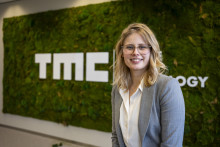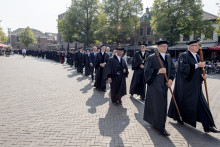It is clearly stated on the GitLab website: the appointments of Sytse – better known in America as ‘Sid’- Sijbrandij are tightly scheduled. About 20 minutes were made available in the CEO’s busy schedule for UT’s Young Alumni Network. Since the IPO of GitLab in October 2021, UT alumnus Sijbrandij has become a public figure. ‘Now people know my net worth. That is a change.’
GitLab's IPO on the US Nasdaq made co-founder Sijbrandij a billionaire overnight, at least on paper. According to experts, with about 2.8 billion – although the price of GitLab has declined heavily since then. Sijbrandij looks back with pride on the move to the stock exchange, he tells interviewer Vincent Verhagen. ‘Co-founding a company and eventually taking it public, it does not get much better as an entrepreneur. It provides visibility for our company, which allows us to attract better people and get more interest from new customers.’
Gitlab grew into a multi-billion euro company within ten years with more than a thousand employees around the world. The initial idea: an open-source platform on which programmers test and improve apps and software together. Kind of like a Google Docs for programmers, though that might be a bit irreverent. ‘Openness is our strength,’ Sijbrandij says. ‘Our customers, who act as a community, contribute to the platform. They love the pace of innovation that it brings.’
Gitlab’s story begins in 2012 when Sijbrandij joins the Ukrainian Dmitry Zaporozhets, who had been working on the idea for a year. Together they founded the company GitLab. During the day Sijbrandij works as a consultant, in the evenings and weekends, he works on GitLab. He invests his fixed salary in the company. ‘A hundred thousand dollars for sure.’ According to Sijbrandij, the long working weeks were not difficult. ‘I do not have kids, so I had plenty of time.’
According to Sijbrandij, he learned entrepreneurship at UT. It is a period that the CEO of GitLab looks back on with great fondness. ‘I started studying Applied Physics at UT in my first year. It was a humbling experience because I was not really good at it. The mathematics part in particular.’ After a year, Sijbrandij switches from Applied Physics to Management Science.
During his studies, he meets a fellow student who sells infrared receivers. Sijbrandij steps in and brings the product to the international market. It shows his talent for building a business for the first time. ‘That was encouraged at UT. For me, it was really the entrepreneurial university. In addition, I was able to develop myself as a person on campus and that still comes in handy every day.’ Sijbrandij regularly returns to his birth soil of Twente. ‘We had a Christmas dinner with friends from my studies and fraternity last holiday.’
All remote
Sijbrandij lives and works in the United States, in San Fransisco more precisely, close to Silicon Valley, the epicentre of just about all successful tech companies. Yet GitLab is a company without a fixed location. Sijbrandij and his colleagues work all remote: there is no office, never has been. The American business magazine Forbes dubbed the Dutch CEO of GitLab one of the ‘greatest minds of the pandemic’ – precisely because of his foresight on working from home.
While the rest of humanity had to get used to working from home in the past two years, this has been the norm for all GitLab employees since the start in 2012. ‘Investors were sceptical about that in the beginning. The pandemic has shown that it is relatively easy to work all remote. Though it is important to facilitate informal communication. Otherwise, people will become lonely, there will be a lack of trust and connection.’
That is why everything – really everything – at GitLab is transparent. In a handbook, every step of the company is accurately recorded, meetings are accurately documented and many video calls can be followed by everyone on YouTube. Even for informal communication between employees, GitLab has written a guide with twenty guidelines. It would go too far to list all the tips, Sijbrandij told interviewer Verhagen.
According to the CEO of GitLab, it is especially important to plan informal contact when you work from home. After all, in the office, these arise spontaneously at the coffee machine. That is a lot more difficult when sitting behind your laptop. ‘At GitLab, there are regualr 25-minute coffee breaks with a colleague of your choice. If you join us, we will make you do five of them. Because at first, it might feel a bit strange. Still, you get used to it quickly.’
After a few questions from the digital audience, interviewer Verhagen receives a message that Sijbrandij has to proceed to his next meeting. As mentioned, the agenda of the CEO of GitLab is tightly managed. Perhaps it’s time for a cup of coffee with a colleague, who is sitting behind a computer screen somewhere in this ever-shrinking world.






